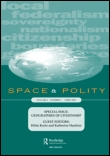
SPACE AND POLITY
Scope & Guideline
Transforming Understanding of Space in Political Contexts
Introduction
Aims and Scopes
- Spatial Politics and Governance:
Explores how spatial arrangements influence political processes, governance, and community engagement, particularly in urban and rural contexts. - Critical Geographies:
Investigates the role of geography in shaping societal structures, including power dynamics, resistance, and cultural narratives. - Digital and Technological Impact:
Analyzes the implications of digital technologies and temporal shifts on social practices, governance, and the spatial organization of communities. - Sustainability and Climate Change:
Focuses on the intersection of environmental challenges with spatial governance, examining how communities adapt to climate change through policy and practice. - Borders and Mobility:
Examines the complexities of borders, migration, and the socio-political implications of mobility in a globalized world. - Urban Studies:
Investigates urban transformations, including gentrification, urban ruins, and the socio-political implications of urban policies.
Trending and Emerging
- Digital Timescapes and Technology:
A significant increase in research examining the interplay between digital technologies and spatial practices, reflecting the growing relevance of digital citizenship and technology in contemporary governance. - Geographies of Resistance and Populism:
Emerging focus on the geographies of resistance, particularly in the context of populism, indicating a critical engagement with political movements and their spatial implications. - Sustainable Practices and Circular Economy:
Rising interest in sustainability, particularly regarding economic transformations in response to climate consciousness, showcasing an increasing engagement with environmental issues. - Community Governance and Local Engagement:
A trend towards exploring innovative models of community governance and citizen engagement, particularly in the context of post-crisis recovery and urban resilience. - Post-Colonial Perspectives on Space:
Emerging themes that critically assess colonial legacies and their impact on spatial politics, particularly in relation to settler colonialism and decolonization.
Declining or Waning
- Traditional Urban Planning:
There is a noticeable reduction in papers focusing solely on conventional urban planning strategies, as the journal shifts towards more critical and contemporary approaches to urban studies. - Nationalism and State-Centric Politics:
Themes centered around nationalism and state-centric politics appear to be waning, possibly due to a growing focus on transnational issues and local governance. - Historical Geographies:
While historical contexts remain important, there has been a decline in research explicitly focused on historical geographies, as contemporary issues take precedence.
Similar Journals
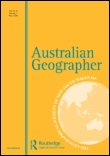
AUSTRALIAN GEOGRAPHER
Charting New Territories in Geographic ResearchAUSTRALIAN GEOGRAPHER, published by Routledge Journals, Taylor & Francis Ltd, is a leading scholarly journal that captures the dynamic and multifaceted field of geography. With an ISSN of 0004-9182 and an E-ISSN of 1465-3311, this peer-reviewed journal has a long-standing tradition, dating back to its origins between 1928 and 1929, and is essential for those engaged in cutting-edge research in Earth-Surface Processes and Geography, Planning and Development. Recognized for its academic rigor, the journal holds a prestigious Q1 ranking in both Earth-Surface Processes and Geography categories as of 2023. Furthermore, its Scopus rankings underscore its influence, placing it in the top 30% of its field. Although it does not currently offer Open Access, AUSTRALIAN GEOGRAPHER remains a critical platform for presenting significant geographic research and fostering academic dialogue, making it indispensable for researchers, professionals, and students eager to contribute to the evolving landscape of geographic scholarship.

disP
Connecting Ideas in Planning and DevelopmentdisP is a premier journal dedicated to the interdisciplinary field of geographical planning and development, published by Routledge Journals, Taylor & Francis Ltd. With a focus spanning from 1980 to 2024, this esteemed publication serves as a crucial platform for sharing innovative research and insights that address pressing spatial challenges and planning methodologies. The journal is recognized for its significant contribution to academia, currently positioned in the Q2 category within Geography, Planning and Development according to the 2023 rankings. It occupies a noteworthy rank of #423 out of 821 in the Scopus database, placing it in the 48th percentile for social sciences within its category. Although it does not offer open access, disP remains an essential source for scholars, practitioners, and policymakers seeking to deepen their understanding of complex development issues and spatial strategies. Its commitment to excellence in research ensures that disP continues to be an influential voice in shaping the future of geographical planning and development.
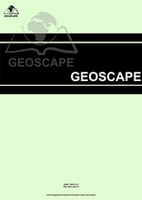
GeoScape
Connecting research with the heartbeat of nature and cities.GeoScape is a distinguished open-access journal published by SCIENDO, operating since 2006 and aimed at fostering knowledge in the fields of Ecology, Geography, Urban Studies, and Nature and Landscape Conservation. Based in Warsaw, Poland, the journal maintains a robust academic presence with an impact factor reflective of its quality, prominently positioned in the Q3 category for multiple significant subject areas as of 2023. With its commitment to disseminating high-quality research, GeoScape holds notable Scopus rankings, including a rank of #94 in Urban Studies and #213 in Ecology, signifying its contribution to environmental science discussions. The journal serves as an essential resource for researchers, professionals, and students seeking to advance their understanding of contemporary ecological challenges and urban development in an accessible format.
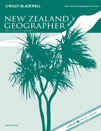
New Zealand Geographer
Advancing Knowledge in New Zealand's Unique LandscapesNew Zealand Geographer, published by WILEY, is a distinguished academic journal that has made significant contributions to the fields of geography, planning, and earth sciences since its inception in 1945. With a dedication to advancing knowledge through rigorous research and critical analysis, the journal encompasses a broad spectrum of topics relevant to both regional and global geographies. This journal is currently indexed in Scopus, achieving commendable rankings in multiple categories, including a Q3 status in both Earth and Planetary Sciences and Geography, Planning and Development for 2023, highlighting its relevance and standing within the academic community. Although it does not currently offer open access, its commitment to providing insightful and impactful content ensures that it remains a vital resource for researchers, professionals, and students alike seeking to deepen their understanding of geographical phenomena. The journal's ongoing publication until 2024 continues to foster scholarly discourse, making it an essential platform for innovative research in geographic studies.

Letters in Spatial and Resource Sciences
Bridging Disciplines in Geography and Resource ManagementLetters in Spatial and Resource Sciences, published by Springer Heidelberg, is a prestigious journal dedicated to the interdisciplinary exploration of spatial and resource-related issues within the fields of demography, economics, geography, planning, and urban studies. Since its inception in 2008, this journal has provided a platform for cutting-edge research, facilitating the exchange of innovative ideas and methodologies that address contemporary challenges in spatial dynamics and resource allocation. With an impact factor reflecting its robust standing in academic circles (notably ranking Q2 in Demography and Geography, and Q3 in Economics and Econometrics as of 2023), it serves as an essential resource for scholars and practitioners alike. The journal is committed to fostering open dialogue and advancing the understanding of spatial phenomena, making it a vital asset for anyone engaged in these dynamic areas of study. Targeting a diverse audience, from researchers to industry professionals, it aims to enhance scholarly communication and promote evidence-based solutions to spatial and resource dilemmas.

European Spatial Research and Policy
Advancing Knowledge in Geography and DevelopmentEuropean Spatial Research and Policy, published by LODZ UNIV PRESS, is a distinguished Open Access academic journal that has been contributing to the field of Geography, Planning, and Development since its inception in 2009. With an ISSN of 1231-1952 and an E-ISSN of 1896-1525, this journal has established itself as a vital resource for researchers and policymakers in understanding spatial dynamics and policy implications across Europe. Recognized within the 2023 Q2 category for Geography, Planning, and Development, it ranks impressively #236 out of 821 in its category on Scopus, placing it in the 71st percentile. The journal’s aim is to foster interdisciplinary dialogue and disseminate innovative research that addresses pressing spatial challenges. Since transitioning to Open Access in 2013, it has enhanced accessibility for scholars, making its rich content readily available to a global audience. Located in Lodz, Poland, European Spatial Research and Policy is poised to continue its commitment to excellence in spatial research, offering critical insights for academics, professionals, and students alike.

Environment and Planning A-Economy and Space
Illuminating Pathways to Sustainable Economic PracticesEnvironment and Planning A-Economy and Space is a leading academic journal published by SAGE Publications Inc, dedicated to advancing the interdisciplinary study of economic and spatial dynamics within environmental contexts. With its strong focus on areas such as environmental science and geography, the journal holds an impressive ranking in the top quartile (Q1) for both fields, reflecting its commitment to high-quality, impactful research. The journal publishes original articles, theoretical insights, and empirical studies that explore the complex interrelations between economy, space, and the environment, catering to academics, practitioners, and policymakers alike. Environment and Planning A is not only pivotal for the dissemination of research findings but also serves as a vital platform for scholarly dialogue, making it indispensable for researchers and professionals aiming to contribute to sustainable development and spatial planning. Please note that while this journal is not currently Open Access, it provides a comprehensive collection of articles from 1973 to 2024, ensuring a rich historical context for contemporary environmental studies.

Journal of Spatial and Organizational Dynamics
Connecting Spaces and Organizations for Global ImpactJournal of Spatial and Organizational Dynamics is a distinguished peer-reviewed journal published by the CIEO, RESEARCH CENTER SPATIAL & ORGANIZATIONAL DYNAMICS, based in Faro, Portugal. Since its inception in 2013, this open access journal has aimed to advance the fields of spatial and organizational studies by providing a platform for innovative research that addresses the dynamic interactions between spatial environments and organizational practices. With a diverse scope that encompasses topics such as urban planning, organizational behavior, and geospatial analysis, the journal fosters interdisciplinary dialogue and insights critical for professionals and academics alike. The journal's commitment to accessibility ensures that research findings are readily available to a global audience, empowering researchers, students, and practitioners to explore the intricacies of spatial dynamics within organizational contexts. By contributing to the growing body of literature in this vital area, the Journal of Spatial and Organizational Dynamics stands as an essential resource for those dedicated to understanding and shaping the interplay between spaces and organizations.
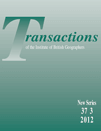
TRANSACTIONS OF THE INSTITUTE OF BRITISH GEOGRAPHERS
Transforming Perspectives on Planning and DevelopmentTRANSACTIONS OF THE INSTITUTE OF BRITISH GEOGRAPHERS is a prestigious journal published by Wiley, focusing on the dynamic field of geography and its multifaceted interactions with earth-surface processes. With an ISSN of 0020-2754 and an E-ISSN of 1475-5661, this journal has made significant contributions to the discipline since its inception in 1976, continuing to publish groundbreaking research that shapes contemporary geographical thought until 2024. Recognized for its rigorous scholarship, it is classified within the top quartile (Q1) of both the Earth-Surface Processes and Geography, Planning and Development categories. The journal holds respectable rankings in Scopus—91st out of 821 in Social Sciences and 22nd out of 179 in Earth and Planetary Sciences—placing it in the 88th and 87th percentiles, respectively. Although it operates under traditional access policies, the depth of research, variety of topics, and the interdisciplinary approach make it an invaluable resource for researchers, professionals, and students alike, promoting a deeper understanding of spatial dynamics and planning within our rapidly changing world.
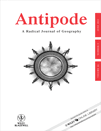
ANTIPODE
Challenging Norms, Inspiring Change in GeographyANTIPODE is a leading academic journal published by WILEY, renowned for its contributions to the fields of Earth-Surface Processes and Geography, Planning, and Development. With an impressive impact factor and ranked in the Q1 category for both Earth and Planetary Sciences and Social Sciences, it is a pivotal resource for researchers and professionals who seek to explore the complex interplay between social and environmental dynamics. Since its inception in 1969, ANTIPODE has provided a platform for innovative and critical scholarship, fostering discussions that drive forward-thinking research in its domain. The journal's rich history continues into 2024, as it remains committed to publishing high-quality, peer-reviewed articles that challenge norms and inspire further research. Researchers, professionals, and students will find in ANTIPODE not only a journal but a community dedicated to advancing knowledge and practice in geography and development studies.